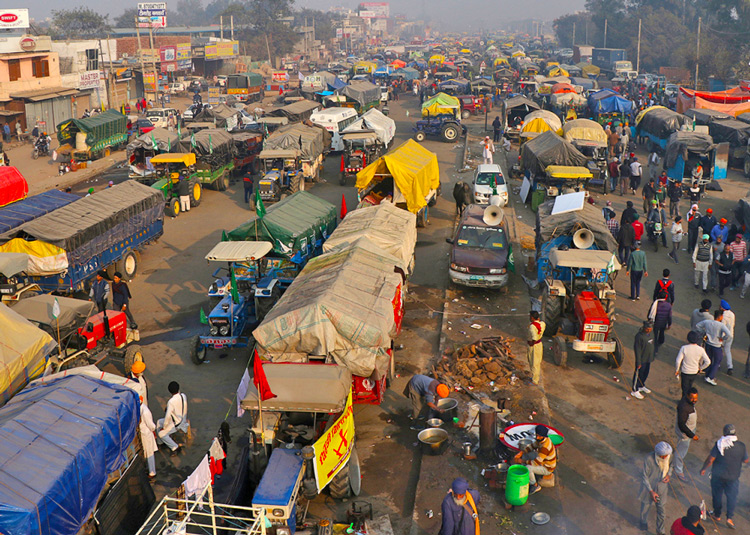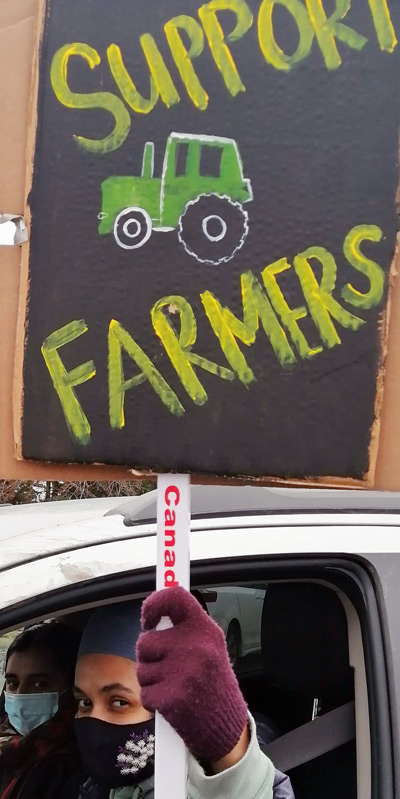Tens of thousands of farmers continue their protest blockade around New Delhi, the Indian capital, demanding Prime Minister Narendra Modi withdraw new agricultural laws that will drive down the prices farmers receive for their crops. They’re fighting to defend their livelihoods and prevent more of them from being driven off the land.
Thousands of farmers arrive each day to swell their encampments. Talks between farm leaders and government ministers remain deadlocked.
“We will not allow the government to change the rules because they want to hurt farmers’ income by filling the pockets of big companies,” Gurwinder Singh, a 66-year-old farmer from Punjab told Reuters at a Dec. 8 protest.
Working farmers from the northern states, many of them Sikhs, have spearheaded the actions. On Dec. 13 hundreds from Rajasthan stalled traffic for hours on the Delhi-Jaipur national highway as police blocked their march into the capital. The next day, farm leaders held a daylong hunger strike, while others staged sit-ins outside government offices.
The governing Bharatiya Janata Party pushed the bills through parliament in September, anticipating that strict COVID-19 pandemic lockdowns it imposed would limit opposition to these moves.
The legislation is to end the decades-old system of state purchases of farmers’ wheat and rice at fixed rates, food that is distributed to millions of people at subsidized prices. The new laws would lift restrictions on big capitalists stockpiling food to manipulate prices and allow them to more easily buy up land from debt-laden small farmers.
“Our students are going to many villages across Punjab to educate farmers about this new farm bill and its negative effects,” Sukhripir Kaur, 22, of the Punjab Students Union, told Al-Jazeera Dec. 14. “Our parents work in the fields and they are the backbone of our economy. What will they do if our land will be controlled by the government and corporate sectors?”
Convoys of tractors with covered trailers set up as makeshift shelters stretch for miles outside of New Delhi. Large community kitchens prepare free meals all day for those joining the protests. The kitchen at Singhu feeds nearly 30,000 farmers and others.
Temporary medical centers staffed by volunteer doctors and nurses dot the camps. Everything from impromptu libraries and bookstalls to laundries have sprung up. Farmers are in for the long haul, building up their stockpiles of supplies. Separate facilities are being erected so more women can stay in the camps.
Modi said Dec. 12 that the farm laws are part of his “modernizing” drive, backed by the ruling capitalist families. His assertion that this would “make farmers more prosperous” is actually aimed at boosting big capitalist farm owners at the expense of millions of small farmers.
The vast majority of India’s farmers, already struggling to make a living on inherited family plots of less than five acres, know they will be worse off. Burdened by growing indebtedness, India’s rural poor have one of the highest suicide rates in the world.
Under pressure of the protests, Modi made a belated offer to retain some of the price supports, but leaders of about 30 farmers’ unions at the head of the actions say it’s not enough.
“If the government wants to hold talks we are ready, but our main demand will remain the scrapping of the three new farm laws,” farm leader Kanwalpreet Singh Pannu told the press.
The opposition Indian National Congress party backs the protests. Some of Modi’s ministers have denounced the actions, claiming they are instigated by the rulers of neighboring China or Pakistan. Others have redbaited farmers alleging their actions are infiltrated by “leftist and Maoist elements.”
“This government wants to give control of Indian farming to big corporates,” Balram Singh, 25, son of a farming family from Punjab state, told The Times of London at the Singhu border encampment Dec. 14. “Farmers will not survive. People will die.”
Big capital has long demanded the Indian economy function as a single market. Modi aims to boost investment from foreign and domestic capitalists to enhance his “Make in India” campaign. In 2017 his government eradicated a multitude of varying tax regulations across the country’s different states for the same reason.
India has the world’s fifth largest economy. Despite the acceleration of urbanization and industrialization in recent years, more than half of the country’s population of 1.35 billion remains dependent on farming.
The capitalist rulers hope to drive more ruined farmers into the cities to work in India’s expanding industry.
Since the 1960s the use of higher yielding crop varieties has helped farmers increase production and reduce widespread food shortages in decades past. Today India is the world’s second largest producer of such crops as wheat and rice, as well as fruits and vegetables. But working farmers have paid the price for this development, increasingly burdened down by loans to buy the necessary seeds, pesticides, fertilizers and machinery.
Workers protest unpaid wages
The farmers’ actions have given new confidence to workers to fight the bosses’ attacks. Thousands of workers at the Wistron manufacturing plant in Bangalore gathered to protest outside the plant Dec. 13, demanding unpaid wages and a reduction in working hours. The company makes iPhones for Apple. When the cops arrived some of the workers ransacked the plant, forcing bosses to suspend production.
Cops detained about 160 of the workers. A minister for the state of Karnataka where the plant is located said its labor department would investigate any underpayment of wages.
The farmers’ actions have attracted support internationally, including from Indian immigrant workers in imperialist countries from North America to western Europe. Solidarity car caravans were staged in New York, New Jersey and Montreal Dec. 13. These came after a larger protest in Washington, D.C., the previous day.
The most popular signs say, “No farmers, no food.”



